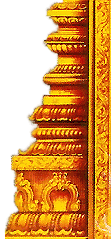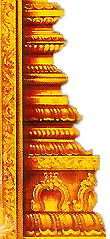|
|
Home >>
Murugan >
sri Swaminathaswami temple
|
| |
- Details
- Path
- Map
- Photos
- Near By Temple
| |
| Sri Swaminathaswami temple |
|
| |
|
![[Image1]](http://img1.dinamalar.com/Kovilimages/T_500_720.jpg)
|
| | |
| | | |
|
|
|
Moolavar | : |
Swaminathar, Subbiah |
|
|
Urchavar | : |
- | |
|
Amman / Thayar | : |
Valli, Deivanai | |
|
Thala Virutcham | : |
Gooseberry | |
|
Theertham | : |
Vajra theertham, Kumaradarai, SaravanaTheertham, Nethra Kulam, Brahmma Theertham | |
|
Agamam / Pooja | : |
- | |
|
Old year | : |
1000-2000 years old | |
|
Historical Name | : |
Thiruveragam | |
|
City | : |
Swamimalai | |
|
District | : |
Thanjavur
| |
|
State | : |
Tamil Nadu |
| |
|
|
| |
|
|
 | Singers: |  |
| |
|
|
| |
Arunagirinadar |
|
| |
|
|
 |
Festival: |
 |
| |
|
|
| |
10 day Tirukarthikai festival in November-December is the important festival of the temple drawing crowd in lakhs. 10 day Chithirai Brahammotsavam in April-May, Vaikasi Visagam in May-June, Aavani Pavithrotsavam in August-September, 10 day Navarathri in September-October, Aipasi Skanda Sashti in October-November, 10 day Margazhi Tiruvadirai in December-January, Thai Poosam in January-February, Panguni Valli Kalyanam in March-April are the other festivals celebrated in the temple. Of these, the festivals falling in Chithirai, Karthikai and Thai Tamil months are inaugurated with flag hoisting. Thirupadi festival for the steps is celebrated on the English New Year day.
Also, monthly Kruthika star days, Monthly Tamil new days, New moon and full moon days, Sashti days, Visakam star days, Tamil and English New Year days, Deepavali and Pongal are devotionally celebrated in the temple. The crowd in the temple is huge on Tuesdays and all festival days. |
|
| |
|
|
 |
Temple's Speciality: |
 |
| |
|
|
| |
Lord Muruga graces devotees in His best attire. He looks with a ripe, wise and philosophical look during the Vibuthi (sacred ash) abishek, a majestic Balasubramania in Sandal abishek. If one closely observes the sanctum sanctorum, the peeta – stage- on which the Lord stands looks like the Shivlinga Avudayar and the Lord as Shivalinga itself. This represents the philosophy that Lord Shiva and Lord Muruga are but one and not different from each other. In the place of the traditional peacock before the Lord, there is elephant here, which was gifted by Indira after the destruction of demon Harikesa, according to scriptures. |
|
| |
|
|
 |
Opening Time: |  |
| | | | | |
The temple is open from 5.00 a.m. to 11.00 a.m. and from 4.00 p.m. to 8.00 p.m. |
|
| | | |
 |
Address: |  |
| | | | | |
Sri Swaminathaswami Temple, Swamimalai, Thanjavur district. |
|
| | | |
 |
Phone: |  |
| | | |
| |
+91- 435- 245 4421 | |
|
| | |
 |
General Information: |  |
| |
|
|
| |
There are no hills in Thanjavur district. It is in this region, Swamimalai stands. As hills are the abodes of Lord Muruga, He is gracing from this hill temple. There are 60 steps to reach the hill temple representing the 60 Tamil Years. These are considered at par with the importance of 18 steps in Sabarimala. The deities of the Tamil years are praying to Lord Muruga in the form of steps. Hence, the Padi Puja (puja for the steps) is conducted on Tamil and English New Year days with coconuts, fruits and singing hymns.
|
|
| |
|
|
 |
Prayers |  | |
|
| | | |
Lord Muruga is the destination for solution of all problems in human life. People appeal to the Lord for happy wedding life, child boon, family prosperity, longevity, education, wisdom, higher education, job opportunities, promotion in jobs and for removal of obstacles in their various endeavours.
| | |
|
| |  |
Thanks giving: |  | |
|
| | | |
Tonsuring in the temple, abishek with sandal, panchamirtha ( a mixture of five ingredients), milk are performed by devotees. Feeding is undertaken by some. Devotees light ghee lamps. Carry milk pots and Kavadi and arrange pujas. Those facing enemy troubles perform Thirisada archana. The rich offer liberal contributions for the maintenance and renovation of the temple. | | | |
| |  |
Greatness Of Temple: |  |
| |
|
|
| |
Swamimalai is the 4th Padiaveedu (army camp) of Lord Muruga. This is where He taught His Father Himself-Lord Shiva. Six feet tall Lord Muruga graces with His tuft, sacred thread on the chest and a staff in the right hand and the left on the lap. It is His Vel weapon that created the Nethra theertha in the temple. He graces in meditation style as a Guru.
He graces with the Vajra Vel representing three divine powers – Itcha Shakti, Gnana Shakti and Kriya Shakti. Mother Earth worshipped Lord Muruga for relief from a curse of Mother Parvathi and even after realizing Her boon, She is staying here in the form of a gooseberry tree.
Swamimalai temple is praised in the hymns of Arunagiriar’s Tirupugazh and in Tirumugattrupadai by poet Nakkeerar considered as the invocation song in Sangam Tamil literature edition. Brahmma, Bhoomadevi, Indira worshipped the Lord in this temple. As the Lord was a Guru to His own Father Lord Shiva, the place is revered as Gurumalai, Gurugiri.
|
|
| |
|
|
 |
Temple History: |  |
| |
|
|
| |
It is a popular story that Brahamma the Creator bypassed Lord Muruga when both met on an occasion without offering the respect to the Young Lord which He deserved. Muruga intercepted Brahmma and demanded the meaning of the Pranava Mantra Ohm. The Creator could not answer. Muruga pounced on Brahmmas four heads and put him in prison as he was not qualified for the creation job. He began creation Himself. Vishnu appealed to Lord Shiva for the release of Brahmma. Muruga obeyed His father’s order. When Lord Shiva asked the Son to explain the meaning of Ohm, the Young Son explained the meaning in detail, but secretly close to Father’s ears as this is such a holy mantra which the righteous and wise alone should know. The event took place in this sacred soil.
|
|
| |
|
|
 |
Special Features: |  |
| |
|
|
| |
Miracle Based:
Tamil word Murugu means all youthfulness and handsomeness. Needless to say that Lord Muruga is handsomeness personified. He shines in every dress-Alankara. He is a ripe spiritual leader in Vibuti abishek, a Majestic Balasubramania in Sandal abishek. If we look closely at the sanctum sanctorum, Lord Muruga appears as the Bana part of a Shivalinga and the peeta as the Avudayar. This is to emphasize the truth that Lord Muruga and Lord Shiva are not different from each other but one.
In the place of peacock as the Vahan, an elephant is before the sanctum. It is said that an elephant Harikesan by name, earlier a demon, worshipped Lord Muruga. This is the elephant, the famous Iravadham gifted to Lord Muruga, according
to Puranas.
Scientific Based
-
|
|
| |
|
|
|
| |
|
|
|
|
| | Location :
Frequent bus facility is available to Swamimalai from Kumbakonam. The temple can be reached very easily.
Near By Railway Station :
Kumbakonam.
Near By Airport :
Tiruchi.
Accomodation :
Kumbakonam:
Green Park: +91-435-240 3912, 13 and 14
Chella: +91-435-243 0336
Aditya: +91-435- 242- 1794 and 95
Lee Garden: +91-435-240 2526
Rayas: +91-435-243 2032
Paradise: +91-435-241 6469
| |
|
 |
|
|
|
|
|





